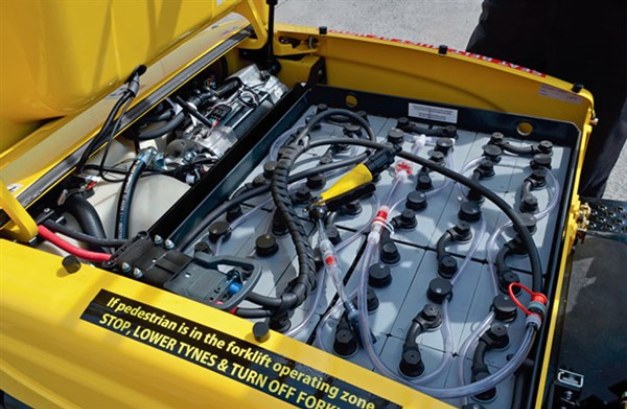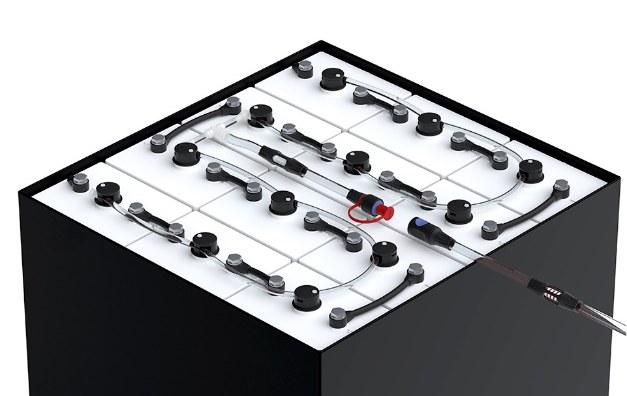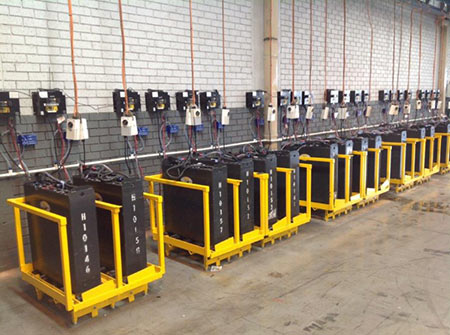When Should a Forklift Battery be Watered?
Watering a battery is an essential part of routine maintenance for any battery electric forklift.
This week’s blog seeks to answer the question of when a forklift battery should be watered and why, whilst also providing a brief overview of common watering systems.
Why is it important to water a forklift battery?
If a forklift battery isn’t watered the internal plates with active paste material become exposed to air, this results in the paste losing its integrity via drying out and crumbling.
The dried crumbled up paste debris then falls off and sinks to the bottom of the battery cell causing it to short and fail.

Benefits of properly watering a forklift battery
Watering a forklift battery regularly ensures the battery provides the best performance every shift.
Adding water ensures that the acid mix in the battery cell is at the correct dilution which then allows the battery to provide its rated power capacity and accept charging properly without generating excess heat.
Benefits include:
- Prolonged battery life
- Reduced likelihood of premature battery failure resulting in forklift downtime
- Reduced likelihood of expensive battery replacements needing to be carried out
- Cycle times in between charges are longer allowing the forklift to operate and be productive for longer
- Reduced energy and maintenance costs
When should a forklift battery be watered?
Forklift batteries should be watered at the completion of a full or equalisation charge.
After charging, the batteries water level will be at its highest and should be carefully topped off.
If a forklift battery is watered at the wrong time this can lead to problems if watering is performed when the battery is partially charged or discharged, acid levels rise and may boil over when charging resulting in dangerous acid spills that may damage the battery and forklift.
If a batteries plates are exposed before charging water maybe topped up enough to cover them whilst the battery is charged, once charging is complete normal watering should also take place.

What types of water can be used for forklift battery watering?
It is recommended to use pure or distilled water when watering forklift batteries.
Dirty or particulate filled water often cause electrolyte imbalances that can damage batteries.
It is important any proposed water source is tested for quality to determine whether it is safe for watering or if distilled water will need to be used as an alternative option.
Forklift Battery Watering Methods
Manual Filling
The most common method of forklift battery watering in the 80’s and early 90’s, each cell would be manually filled via a jug and funnel using the fillers judgement.
Method was very time consuming to water multiple batteries and also inaccurate with cells often being over or under filled leading to higher levels of battery damage.
Single Point Watering (SPW) System
SPW systems are very common and accurate watering system.
Each battery has a vent plug with a float lever valve, the plugs are interconnected via PVC hose.
A main feeder hose connects to the system allowing water to disperse from a central location into each battery cell.
As each cell fills to the correct predetermined specified level the float is raised up and cuts the flow of water to the battery cell.
SPW systems can be filled via the following:
- Manual water filling gun connected to a garden hose or tap
- Gravity feed system
- Water trolley with electric pump
- Automatic water solenoid triggered by the charger

The above photo shows a SPW system with automatic watering solenoids to accurately control the amount of water being fed into each battery.
To assist operators and staff in keeping your forklift batteries in optimum condition consider hanging up a forklift battery care poster in your charging and watering station.
For assistance with battery watering or setting up a single point watering system contact our team on 13 22 54 or complete a contact form and we will contact you as soon as possible.